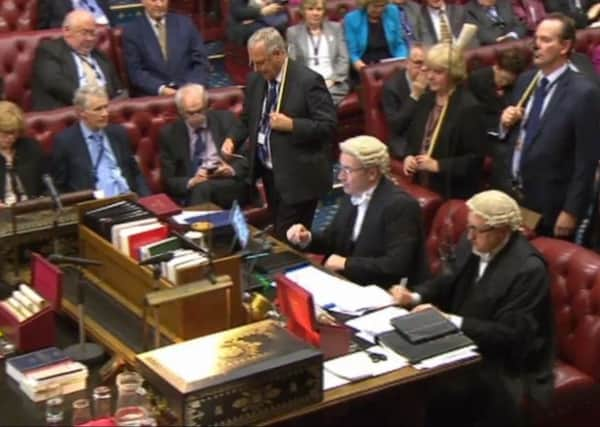Andy Price: Brexit is defining issue for parties '“ to Labour's cost


Beyond the complex constitutional issues it raises for the UK as a whole – from a second referendum on Scottish independence, to our border with the Republic of Ireland in Ulster – what will be the impact on the British political scene in London?
We have seen how Brexit pushed and pulled at British politics, reshaping all in its wake since June 2016, and we should expect that the trends we have seen thus far will continue.
Advertisement
Hide AdAdvertisement
Hide AdFor the Conservative Party, every indicator since June is screaming at them: more of the same, please.
Theresa May’s decisive, unilateralist approach to a strong and clear policy on Brexit from the very start has brought, in the Tory party at least, some much needed stability. The eurosceptics pose the least threat to the party leadership in a generation, dissenting Tory voices on Brexit can be numbered on one hand, and the eurosceptic Press is overwhelmingly on board.
This approach seems to have wider appeal amongst the electorate, too. Recent polls show the kind of lead prime ministers can normally only dream of. A cementing of this ‘no compromise’ approach to Brexit, then, seems the only sensible policy action for May and her team.
If more of the same is the order of the day for the Tories, then more of the same – whether they like it or not – looks to be the order of the day for the Labour Party, too. Every Labour MP who followed the party line, and essentially voted themselves out of any involvement with the Brexit Bill and ensuing negotiations, should remember this salient point: the EU will not be negotiating Brexit with Her Majesty’s Opposition, only with the Government.
Advertisement
Hide AdAdvertisement
Hide AdNo matter how complicated politics becomes once Article 50 is triggered, no matter what happens to sterling, to the cost of living, no matter what potentially destabilising forces we see unleashed as the politicians and peoples of Europe set about unpicking six decades of internationalism, Labour has counted itself out of any involvement, out of any scrutiny.
It is hard to see what meaningful future the Labour Party has in opposition, let alone in government, when it has declared itself mute on the biggest issue to face this country in peacetime.
Of the three main parties, it is arguably the Liberal Democrats whose fortunes will be most transformed by Brexit. No matter what side you are on, it is hard to argue with the fact that the Lib Dems have provided a lone voice of opposition: a brave voice, in fact, in the face of a dominant majority following the referendum.
Overcoming the electoral mauling of 2015, Tim Farron and his party – with the help of former deputy PM and their Brexit spokesman, Nick Clegg – have consistently played that crucial role afforded to minority groups in a democracy: the role of dissenting, of raising the possible problems of the majority position, problems that are often lost in our rush to fulfil an electoral expression of the popular will.
Advertisement
Hide AdAdvertisement
Hide AdAgain, as the ripple effects of the negotiations begin to make themselves felt from this month forward – from the challenge of the centuries-old constitutional settlement of the nations of the UK, to the hardening of our relationships with our European allies – the Lib Dem position of offering sensible and reasoned counter-arguments may seem ever more attractive. And importantly: it may appear ever more consistent.
This notion of consistency is essential to the success of national parties in liberal democracies. We see it time and time again: once dominant parties, seemingly untouchable in terms of their hold on the electorate, suddenly beginning to falter as soon as the cracks begin to appear.
From the decline of the Tories in the mid-1990s, to the eventual fissures in New Labour that bubbled up in the Brown-Blair tension and would result in a chaotic Brown government, and even the divisions of the Lib Dems themselves over tuition fees and their role in the coalition: fractured parties always haemorrhage support.
As such, it looks like the Lib Dems and the Tories have the fewest obstacles before them on their respective paths through the Brexit woods over the next two years: the Tories, in their unifying quest of Brexit at all costs; the Lib Dems in their sensible objections to this process.
Advertisement
Hide AdAdvertisement
Hide AdIn the middle, the Labour Party looks not only to be confronted by obstacles, but to be unaware of where its path through the Brexit woods lies at all.
Dr Andy Price is head of politics at Sheffield Hallam University.